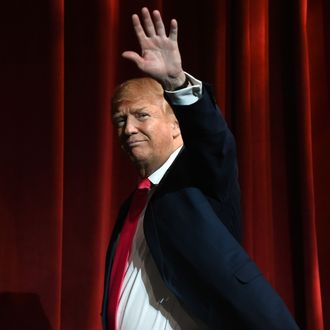
A very interesting argument has broken out over an unusual political question: If Donald Trump loses in November, can he be pushed aside while Republicans find ways to appeal to his core supporters?
Party gadfly David Frum seems to assume Trump will go away quietly:
[O]nce safely excluded from the presidency, Donald Trump will no longer matter. His voters, however, will. There is no conservative future without them.
Frum, to his credit, was warning Republicans for years that the GOP’s indifference to the actual views of its actual voters on the economy and immigration would eventually become a critical problem. He was right. So he has some credibility in seeking to craft a policy agenda and message that scratches the itch Trump scratched with so much excessive force.
But that doesn’t mean Trump won’t have anything to say about it.
Jeet Heer isn’t a Republican but makes a good point in responding to Frum that you cannot keep the baby without the bathwater when it comes to Trump’s fans:
[W]ill Trump really cease to matter in November? After all, no human being loves the spotlight more, and he’s chased after media attention since he was a young man. Being the nominee of a major party is a dream job for him, because it means people will hang on his every word. Even if he loses badly in November, Trump will likely cling to his status as the strangest “party elder” ever—and convert it into new, attention-grabbing and lucrative projects.
Fortunately for Republicans, the old tradition of referring to the immediate past presidential nominee as the “titular head” of the party has fallen into disuse. But presidential nominees rarely just go away. Perhaps the most self-atomizing recent major-party nominee was Democrat Michael Dukakis. But his demise after 1988 was not strictly attributable to his loss of what most Democrats considered a winnable general-election race against George H.W. Bush; his last two years as governor of Massachusetts also made a terrible mockery of his claims of an economic and fiscal “miracle.” And, besides, nobody thought of Dukakis as ideologically distinctive or as leading any sort of political “movement.”
The bottom line is that the same media tactics that improbably made Trump a viable presidential candidate in the first place will help him stay relevant even after a general-election loss, unless (a) it is of catastrophic dimensions and (b) cannot be blamed on tepid party Establishment support for the nominee.
If Trump loses so badly that he does indeed become irrelevant, then people like Frum will have another problem: competing with those who want to dismiss the whole Trump phenomenon as a freak event with no real implications for the Republican future. And yes, such people will be thick on the ground, attributing the loss to Trump’s abandonment of strict conservative orthodoxy on the very issues Frum thinks were responsible for the GOP alienation of its white working-class base from the get-go. There will be show trials and witch hunts aimed not just at Donald Trump and his most conspicuous supporters and enablers, but also at people like Frum — and more broadly, the Reformicon tribe of which he is often regarded as a key member — who think Trump was revealing important shortcomings of the orthodoxy many others will be trying to restore.
So, ironically, and even tragically, #NeverTrumper David Frum may discover that Trump will not only still be around, but could wind up on his side of the intra-party barricades.






























